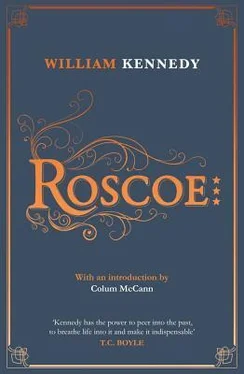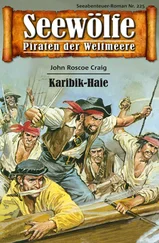Elisha packed his trunks and sailed to Barcelona with Veronica and stayed two months in quiet isolation, even from the English language, identifying with hubristic martyrs and victims of too much opportunity. He returned only when the baseball pool had receded from the headlines, and a crisis of indolence had arisen at the mill: roofs leaking, machines rusting from nonuse, shops frequently broken into, and tools, supplies, even small machinery stolen. Also, there was one successful suicide, one unsuccessful suicide attempt among former mill employees, both of whom Elisha knew well, and whose financial sorrows he blamed on himself for having committed crimes for which there was no redemption.
Patsy was sent to the Federal House of Detention in Greenwich Village, in Manhattan, but not before Roscoe arranged, with Tammany’s influence over the jailers, for Patsy to spend afternoons down the block at the home of Philly McQuaid, a bucket-shop operator and Patsy’s close friend for years, and to return to his fourteen-bed dormitory for lights-out anytime before nine-thirty. On weekends when the weather was good, Mush Trainor, who also lost millions in the market crash, drove Patsy to his summer place in the Helderbergs in a Willys sedan Mush had stolen and repainted for Patsy’s incognito travel. Patsy did five of his six months and earned a month off for good behavior. He came home in late April 1931, a notable year for crime and punishment in Albany.
Roscoe at the Apex
While Roscoe lay on the operating table having his heart invaded, the surgeon found, nestling near the heart’s traveling bag, a sliver of one of the bullets that had pierced Roscoe during his heroic desertion from the French battlefield in 1918. When told he’d been harboring a piece of the reality that had wounded him twenty-seven years earlier, Roscoe said the discovery proved some wounds never heal because they belong to primordial human trauma: the wrong choice. And he was thrust backward to early 1931, when Elisha was licking his wounds in Spain, Patsy was sleeping under a federal roof, and Roscoe alone was running the Albany Democracy. In those months, Democratic headquarters was never busier, visitors arriving without end — Party regulars bringing the temporary Caesar news, whispers, beseechings, money, and votive offerings, and also wondering: By the way, Roscoe, has the world changed? Is Patsy gone forever? Has Eli moved to Spain? You look good at the top, Ros.
Such obeisance Roscoe had been accepting for years, never on his own behalf, and now that the power was his alone, however temporarily, he didn’t like it or want it. It did not improve the climate of his spirit. Serious meaning did not inhere in his power to transform the life of anybody who walked through his door. An entire society structured on extortion and subordination: what a way to live. Roscoe never coveted that, but never wanted to be subordinate, either; and yet knows he is (and isn’t when you look in the opposite direction). So why, then, has he inhabited this place for so long? Not power? Then maybe the lush life, or access to love and beauty? A major side dish, said Roscoe, but how do you live on love alone? Only in the song. Going for the main chance is it? Possibly. But Roscoe is still trying to define that one. He had goals once: merchant-politician like Felix, no; scholar and teacher, historian perhaps, using your brain appeals, reading books for a living, but no; constitutional lawyer — now, there was an aspiration, but you had to practice law first — egad, no; maybe the theater, you’re a great actor, Roscoe, with a hell of a voice, and everybody’s known that about you since school days and the Elks Club minstrels; but no, no thanks.
The truth is that Roscoe would’ve had to take too many time risks, give up too much life-at-hand, to pursue such long-distance goals. So he gave up the goals: rational cowardice his basic survival tactic while he kept chasing that elusive main chance, where the hell was it? When would it turn up? Meantime, there was the communal motive: to live equal among revelers in conquest. Yes, that’s what we were about, why we went into politics. Yes, indeed, conquest, yes, yes, that surely must be the motive. We’ll work to elevate the people, our people, and any others out there who need a leg up into equality: generic Democrats who couldn’t get jobs for twenty years. Right. The poor, the working class, that’s us. Anybody with more than five thousand dollars should be a Republican. We don’t want people starving because they’re Democrats. Not nice to live and die in hungry silence. Patsy, Roscoe, Elisha couldn’t bear such silence. Manic life, the gamble, game chickens, high action, the campaign, that’s the stuff. Patsy, the redeemer, replaces every failure (a form of death) with success. Yesterday’s defeat has got to become tomorrow’s plurality, which is Patsy’s formula as a relentless winner, and that’s how he redeems. When Pat walks down the street a crowd follows, you’d think he was Jesus passing out the loaves and fishes, primitive patronage, but that’s how it’s still done.
Now, as Roscoe lies on the operating table with his heart sliced open, he ponders dying like Elisha, really dying this time, you can’t live without a heart. He senses that he is being commanded to survive, so he makes a forcible point to himself — Don’t die, Roscoe, survive — which some may say begs the question. But as the survival word sibilates on his tongue, Roscoe hears it as a eureka truth built into the fabric of the being, and he sees that it’s the cause of all wars, of every argument for and against the Empire, the Nazis, the Fascists, the Japs, the reason we convert the infidels and save the pagans, the reason we subdue the aborigines, the barbarians, the Republicans; it’s why kings have that divine right and why we absolutely must win the Ninth Ward; it’s at the heart of Manifest Destiny and the lemming society, of the mad oligarchs, the killer hordes, the holy despots, and also Dracula, who certainly knows how to preserve his soul. How? You get the money. How do you get the money? Oh my Jesus. Money is blood. Get it any way you can. Money buys survival. Too bad about that stock market. Those fellows should’ve tried politics, which is the real stock market. Roscoe, with his heart wide open and susceptible to scalpel slashings and invasions of the blood by unholy elements, knows that Elisha and Patsy, and then he himself in his brief time at the apex, all stepped out of the crowd; and not only did they survive, they achieved pre-eminence, and forever after have been forced to live like lions among hares, arguing at the council of beasts that laws cannot be made for them both. “Where are your claws and teeth?” the lions asked the hares. Demigods, mud gods, gods on a stick, but gods with the power of obliteration are what this triumvirate looks like from below. Shoot them in the chest, put them in jail, make them drink poison, they will refuse to die, even after they are dead. Equals in the revel, yes, and the revel will now continue if they can only put Roscoe’s heart back the way they found it. And then he will continue with new clarity, for wisdom has descended and Roscoe has circled his malaise all the way back to first cause, which turns out to be just like that sliver in the heart: the consequence of the wrong choice. So very simple, Ros, but it raises another question. Which wrong choice are we talking about?
When Roscoe came back to Tivoli at Veronica’s insistence, purged of dead blood, healed in invisible ways, Veronica kissed him sweetly, possibly a bit of the old passion there, but that’s subject to interpretation. She coddled him with steamed clams, prime ribs with a mountain of mashed potatoes, and a dish he had once professed love for and forgotten he loved, chicken-liver-and-mushroom pie. Veronica had not forgotten. Alex offered restrained good wishes, with no hostility, and it seemed that heart trouble, for the moment, had liberated Roscoe from tension within this family, the only one to which he felt he belonged; for his only surviving sister, the sweet Cress, was as distant as a fifth cousin, and O.B. less a brother than a plenipotentiary of the Party, blood not necessarily thicker than politics.
Читать дальше












